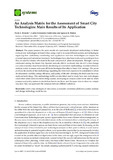Mostrar el registro sencillo del ítem
An analysis matrix for the assessment of smart city technologies: main results of its application
| dc.creator | Branchi, Pablo Emilio | es_ES |
| dc.creator | Fernández Valdivielso, Carlos | es_ES |
| dc.creator | Matías Maestro, Ignacio | es_ES |
| dc.date.accessioned | 2017-11-15T08:00:44Z | |
| dc.date.available | 2017-11-15T08:00:44Z | |
| dc.date.issued | 2017 | |
| dc.identifier.issn | 2079-8954 (Print) | |
| dc.identifier.issn | 2079-8954 (Electronic) | |
| dc.identifier.uri | https://hdl.handle.net/2454/26147 | |
| dc.description.abstract | The paper presents the main results of a previously developed methodology to better evaluate new technologies in Smart Cities, using a tool to evaluate different systems and technologies regarding their usefulness, considering each application and how technologies can impact the physical space and natural environment. Technologies have also been evaluated according to how they are used by citizens, who must be the main concern of all urban development. Through a survey conducted among the Smart City Spanish network (RECI) we found that the ICT’s that change our cities everyday must be reviewed, developing an innovative methodology in order to find an analysis matrix to assess and score all the technologies that affect a Smart City strategy. The paper provides the results of this methodology regarding the three main aspects to be considered in urban developments: mobility, energy efficiency, and quality of life after obtaining the final score for every analyzed technology. This methodology fulfills an identified need to study how new technologies could affect urban scenarios before being applied, developing an analysis system to be used by urban planners and policy-makers to decide how best to use them, and this paper tries to show, in a simple way, how they can appreciate the variances between different solutions. | en |
| dc.description.sponsorship | The authors would like to acknowledge Spanish Ministry of Economy and Competitiveness for the financial support through TEC2016-78047-R and Government of Navarra (Spain) Research Grants. | en |
| dc.format.extent | 13 p. | |
| dc.format.mimetype | application/pdf | en |
| dc.language.iso | eng | en |
| dc.publisher | MDPI | en |
| dc.relation.ispartof | Systems, 2017, 5(1), 8 | en |
| dc.rights | © 2017 by the authors; licensee MDPI, Basel, Switzerland. This article is an open access article distributed under the terms and conditions of the Creative Commons Attribution (CC BY) license. | en |
| dc.rights.uri | http://creativecommons.org/licenses/by/4.0/ | |
| dc.subject | Smart cities | en |
| dc.subject | Strategies of innovation | en |
| dc.subject | Community awareness platforms | en |
| dc.subject | System analysis and design | en |
| dc.subject | Technology social factors | en |
| dc.title | An analysis matrix for the assessment of smart city technologies: main results of its application | en |
| dc.type | Artículo / Artikulua | es |
| dc.type | info:eu-repo/semantics/article | en |
| dc.contributor.department | Institute of Smart Cities - ISC | es_ES |
| dc.rights.accessRights | Acceso abierto / Sarbide irekia | es |
| dc.rights.accessRights | info:eu-repo/semantics/openAccess | en |
| dc.identifier.doi | 10.3390/systems5010008 | |
| dc.relation.projectID | info:eu-repo/grantAgreement/ES/1PE/TEC2016-78047-R | en |
| dc.relation.publisherversion | https://dx.doi.org/10.3390/systems5010008 | |
| dc.type.version | Versión publicada / Argitaratu den bertsioa | es |
| dc.type.version | info:eu-repo/semantics/publishedVersion | en |
| dc.contributor.funder | Universidad Pública de Navarra / Nafarroako Unibertsitate Publikoa | es |



